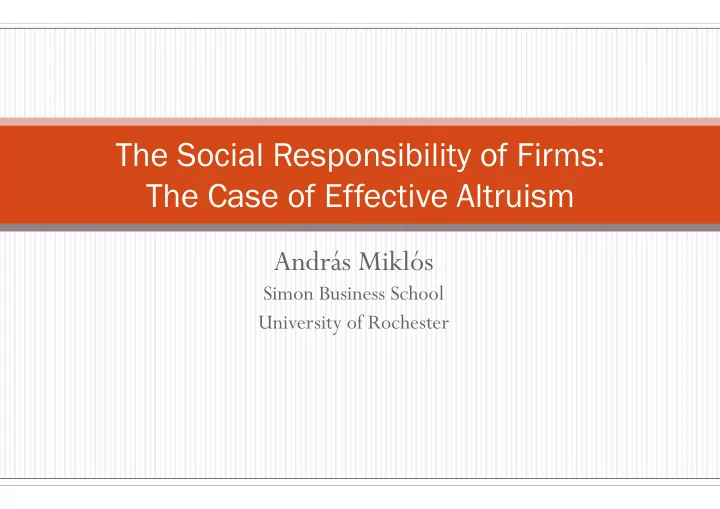

The Social Responsibility of Firms: The Case of Effective Altruism András Miklós Simon Business School University of Rochester
Sustainability in business A mix of political, social, environmental, and economic goals How should these be reflected in business? A criticism of Corporate Social Responsibility (CSR) initiatives, triple bottom line, and stakeholder management approaches is that they are too vague : they do not offer a principled method for dealing with trade-offs e.g., how to share value between shareholders, employees, communities and other stakeholders? Likewise, how can firms decide which aspect of sustainable development goals they should prioritize? e.g., how to prioritize between reducing poverty and combating climate change? 17 global goals with 169 targets
Alternative methods for setting priorities “doing well by doing good”: strategic CSR; enlightened stakeholder value 1. maximization: no (long term) profit sacrifice Cost-reduction, e.g., through reducing waste Costs passed on to consumers, employees: e.g. Fair trade Long term benefits generated for firms by avoiding short termism; buying goodwill from regulators, the public, employees, customers, suppliers An alternative approach: Effective Altruism 2. May require sacrificing some profit for the social good Trade-offs between creating value for shareholders vs other stakeholders Managers could act on their own initiative Delegated: shareholders could accept lower returns on their investment
Effective Altruism: Doing the most good Peter Singer on Effective Altruism: Living a minimally acceptable life involves using a substantial part of our spare resources to make the world a better place Living a fully ethical life involves doing the most good we can Effective Altruists donate large parts of their income to the most effective charities They choose careers in which they can earn the most so that they can do the most good Effective Altruists want to get the greatest “bang for their buck” What about shareholders, managers, firms? Should they do the most good they can?
Corporate altruism: supporting considerations Should firms practice philanthropy through developing, pricing and delivering their products and services? Firms have cost advantages in achieving health, social and environmental goals: Special competencies, resources: know-how, skills, scarce goods, etc. Complementarities: economies of scale and scope The rationale for using the firm as a vehicle for altruism is cost-effectiveness Firm decisions about product development, pricing, and delivery have implications for global health, social and environmental goals
Limitations of corporate altruism Disagreements, value trade-offs Unresolved value trade-offs: For whom to create value? What kind of value to create? Special responsibilities: to respect the rights of shareholders, employees; not to cause harm Accountability in the face of disagreement Institutional division of labor Adversarial interaction within markets Fiduciary duties within firms
Disagreements, value trade-offs What does doing the most good really mean? Should the worst off be given some priority when others can be helped more effectively? Are there ethical differences between the kinds of benefit a firm could provide? Aggregating small benefits to many people vs very large benefits to a smaller number Are firms constrained by ethical values whose validity does not depend on maximizing the good? Fair chances; Rights; Freedom; Responsibility for harms caused
Responsibility to respect rights Shareholders: Maximized profits Should a CEO develop/price/deliver products or services that do the most good but fail to maximize profits? Employees: Labor conditions: e.g. workplace safety, unions Nonexploitative wages Should firms create more low-paid jobs with unsafe working conditions or fewer jobs that offer nonexploitative wages and safe working conditions?
Accountability – Why? To whom? How? Unresolved disagreements about value The issue of accountability may not arise for small-scale individual charitable giving But it does for corporate altruism (and for NGOs) Difference between (small scale) investor and managerial perspectives on corporate altruism Shareholder vs stakeholder interests Are firms/managers accountable to shareholders only? Or are they accountable to all potentially affected by their actions?
Accountability – Why? To whom? How? Political values When firms engage in making public policy, they need to consider political values that appropriately constrain decision making in public policy Fair procedures, legitimacy, inclusiveness, transparency, publicity Some reasons to be cautious about setting social/environmental goals that compete with profits Providing managers with a mandate to pursue social/environmental goals or to maximize the firm’s net social impact may undermine managerial accountability ; Corporate governance problems are exacerbated: unsolved disagreements about priority setting make both defining managerial objectives and performance evaluation more contentious
Implications for Sustainable Development Goals Are there value trade-offs involved in the prioritization of various SDGs? Should managers have a mandate to pursue social/environmental goals independent of (long term) profit considerations? Should SDGs be reflected in setting managerial objectives and evaluating managers’ performance? How should firms accommodate political values in prioritizing between SDGs? Fair procedures for decision making Division of labor between political institutions and firms in shaping public policy
Recommend
More recommend